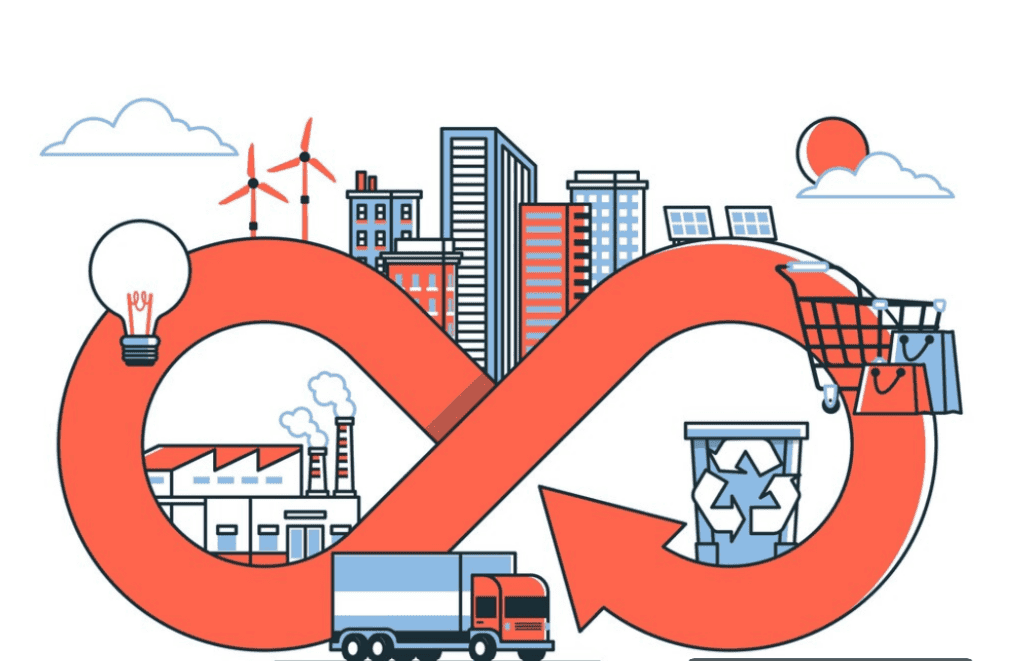Environmental problems are growing on a global scale which is why many businesses and governments around the world are adopting more sustainable solutions. A transformative one is Extended Producer Responsibility (EPR), which is a policy approach aiming at increasing the responsibility of producers within the life cycle of their products, thus preventing negative environmental externalities. Companies like Escrappy Recyclers in the UAE are emerging as industry leaders to sustainable and greener solutions through aligning with EPR.
Extended Producer Responsibility Explained
Extended producer responsibility (EPR): an environmental regulatory scheme that shifts the responsibility of managing the effect of a product on the environment away from those that produce it and onto the producers. In the context of such a framework, manufacturers are liable for the entirety of their product’s lifecycle including:
Design & Production: Using sustainable materials and production processes.
CIRCULARITY STAGE: Consumption and Use: Making sure that products fulfill sustainability criteria
Management at the End of Life: Enabling recycling, reuse, or disposal safely.
Such a proactive strategy engenders innovation while simultaneously relieving pressure on natural resources and opening paths to a circular economy.
Why is EPR important in the UAE?
Introduction The United Arab Emirates (UAE) has experienced rapid economic growth over the past half-century, fueling increasing levels of waste generation common to many modern urbanized societies. The challenges can be effectively addressed by EPR as it…
Waste Reduction: Reducing the amount of waste generated by promoting recycling and reuse rather than disposal in landfills.
Encouraging sustainability: Encouraging industries towards better practices.
Increasing Resource Utilization: Reducing reliance on raw materials using recycling through E waste collection in Dubai.
Compliance to Global standards: Bringing us at par with world sustainability goals.
Escrappy Recyclers: An EPR Trailblazer
One of the UAE’s leading recycling companies, Escrappy Recyclers, is already taking steps to work on EPR. Escrappy Recyclers are particularly driven by sustainability and work responsibly towards the management of electronic wastes, making them EPR compliant by:
Alternative Solutions for Recycling
Escrappy Recyclers employs state-of-the-art recycling methods to recover recyclables from e-waste. This reduces environmental impact and also encourages reuse of components, preserving resources.
Producer Partnerships
They partner with manufacturers that want to create sustainable product designs and recycling programs. Such relationships offer an end-of-use solution for product take-back and ultimately keep factories from filling landfills.
Consumer Awareness Programs
They also run awareness campaigns on the significance of responsible e-waste. This is a great model that encourages responsible recycling behaviors since consumer knowledge and attitude are important.
Compliance and Certification
Escrappy Recyclers strictly abides by environmental laws in and out of the country, offering certifications that help businesses comply with EPR laws. It also boosts credibility on their part and makes it much simpler for their clients to be compliant with regulators.
Benefits of EPR Adoption
EPR Principles for Enterprises: Some Advantages
A) Environmental Protection
EPR can help reduce pollution, save resources, and reduce climate change impacts all by ensuring that waste is managed responsibly.
B) Economic Growth
EPR also promotes the development of new recycling technologies and green product designs, which can generate new jobs and economic opportunities in the sustainability sector.
C)Business Social Responsibility (BRM)
EPR through business implementation indicates better brand goodwill and trust among consumers as it promotes environmental responsibilities.
D)Regulatory Compliance
EPR quantifies the liabilities businesses incur owing to strict environmental laws and enables firms to evade penalties besides promoting goodwill with environmental regulators.
Problems in the Implementation of EPR
EPR is a terrific program but unfortunately comes with several challenges:
Expensive to develop sustainable products and recycle infrastructure.
Public Engagement: Getting the general public involved in recycling continues to be a challenge.
Not-so-simple supply chains: The product lifecycle involves multiple parties, and reconciliation can be a challenge.
The Impact of Policy and Innovation
To counter these challenges, governments and businesses need to work together to:
Create Incentives: Providing tax exemptions or incentives to companies that follow EPR practices.
Infrastructure heading investment: Set up of proper recycling facilities, research in sustainable technology
Conduct awareness campaigns regarding EPR for producers, consumers, and recyclers
Escrappy Recyclers: Leading the Change in the UAE
R2 certified e-waste recycling Dubai is a shining example of how businesses can revamp their ways, pivot to sustainable practices, and still thrive while making a positive impact on our planet, by being committed to sustainability and following the principles of EPR. This is in line with the UAE Vision 2030 goals, focusing on sustainability and innovation as pillars for the growth of the nation.
In Conclusion
Extended Producer Responsibility is simply beyond environmental policy; it is a road toward sustainable development. With EPR the model, firms such as Escrappy Recyclers are in a sense not only solving the existing environmental-related problems but also setting an example of how businesses should operate in the UAE (and beyond). Through sustained collaboration and innovation, EPR can help steer the shift from a linear to a circular economy to secure future generations a greener, cleaner, and more sustainable world.

